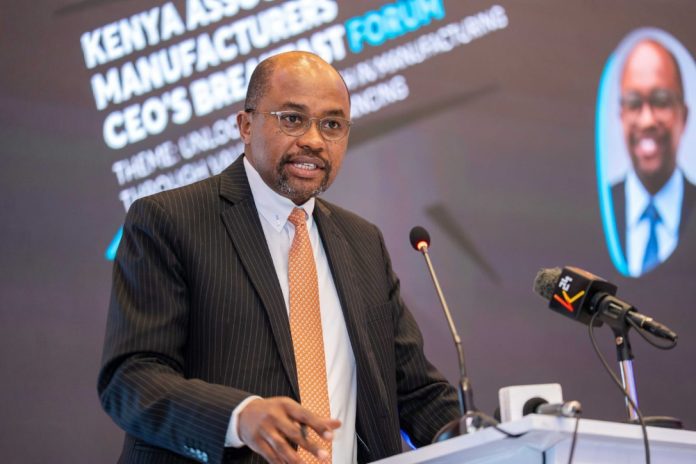NCBA, in partnership with the Kenya Association of Manufacturers (KAM), has today hosted a CEOs breakfast forum, themed “Unlocking Growth in Manufacturing through Value Chain Financing” in Nairobi.
NCBA Group Director Corporate and Investment Banking Advisory, Tirus Mwithiga emphasized on the need to rethink how capital is structured and delivered across Kenya’s industrial ecosystem, “Manufacturing currently contributes 7.3 per cent to Kenya’s GDP, significantly below the government’s 2030 vision target of 20 per cent. This forum underscores our commitment to go beyond banking, to become true enablers of business transformation for manufacturers.”
NCBA showcased its financial solutions, including asset leasing, trade finance, and supply chain financing, which support business sustainability and cash flow management for manufacturers. The bank reiterated its commitment to providing tailored, ecosystem-driven solutions that go beyond lending, offering long-term advisory, partnership development and policy alignment support.
NCBA Bank expands to Kawangware with 99th branch
“We are working closely with industry associations, aggregators, and off-takers to fund structures that traverse entire value chains. This reduces risks to our customers and ensures that funding leads to measurable growth. We are also actively participating in public-private dialogue to shape policies that improve the ease of doing business and conducting market research to facilitate our clients in making viable decisions.” added Mr. Mwithiga.
Kenya’s manufacturing sector plays a vital role in job creation and economic development, employing over 350,000 people directly and supporting more than 1.6 million indirectly. According to data from KNBS, the sector grew by 2.1% contributing to an overall GDP growth of 4.9% in the first quarter of 2025. Despite its potential, the sector continues to face challenges in limited access to affordable capital, supply chain fragmentation and weak regional competitiveness.
“When we talk about value chain financing, we are talking about ensuring everyone in the chain: from the farmer, aggregator, transporter, to the processor and final manufacturer, is bankable. That means innovative financing products that respond to the cyclical nature of the manufacturing sector,” said Tobias Alando, Chief Executive of KAM.
KAM continues to champion such dialogues that bring together the financial sector, industry, and policy players.
“We need affordable and long-term financial instruments that align with production cycles, de-risk investment in primary processing, and support businesses, from SMEs to larger players to expand and stay competitive in both local and global markets.” Added Mr. Alando.
The event concluded with a renewed call for greater collaboration among government, financiers, and industry players to create an enabling environment for growth.









